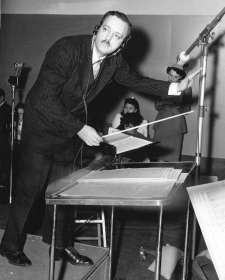|
|
|
Leith Stevens Born in Mount Moriah, Missouri, on September 13, 1909, Leith Amadeus Stevens grew up in a musical family,
and as a child he began to study many aspects of music while focusing on the piano. In addition to learning classical music, he was also exposed to popular styles, including jazz, and in his mid-teens he served as a
pianist, conductor, and in other capacities for WHB radio in Kansas City. He debuted as a concert pianist with the Horner Institute Symphony Orchestra, and at the Horner Institute (later the Conservatory of Music of
the University of Missouri) he studied piano, conducting, and composition, as well as orchestration with Robert Russell Bennett. In 1927, he received a fellowship to Juilliard in New York, and also began work at CBS radio, first as a vocal arranger, then as a conductor and composer. In 1933 he wrote for the Columbia Workshop series, and he composed and conducted for many other radio shows, including The Fred Allen Show and The George Burns and Gracie Allen Show. Stevens conducted for the CBS Symphony Orchestra, and in 1938 became head of the CBS Music Department in New York City, later working for the California-based CBS radio show Big Town. In 1942 he was musical director for RKO’s Syncopation, which was about the history of jazz, and in 1946 he scored Night Song. He joined Universal-International in the late 1940s, conducted the Hollywood Bowl Symphony Orchestra, and also composed classical works. Stevens’ film composing career took off in the late 1940s, including writing for Eagle-Lion films The Great Rupert (also produced and directed by Pal and Pichel) and Never Fear, the latter of which was directed by Ida Lupino, who also helmed the Stevens-scored Not Wanted. He made his mark in the world of jazz-based scores with The Wild One and Private Hell 36, and also did work for M-G-M, 20th Century-Fox, and Paramount, where he was hired as Director of Television Music in 1969. His television work included Cheyenne, Daniel Boone, Lost in Space, Mr. Novak, The Twilight Zone, and Voyage to the Bottom of the Sea, and some of his feature work was done for The Atomic City, Beware, My Lovely, The Bigamist, But Not for Me, City Across the River, Cop Hater, Crashout, Feudin’, Fussin’ and A-Fightin’, The Five Pennies, The Garment Jungle, The Glass Wall, Great Day in the Morning, The Green-Eyed Blonde, Hell to Eternity, The Hitch-Hiker, The Interns, It Happened at the World’s Fair, The James Dean Story, Julie, Larceny, Navajo, A New Kind of Love, The Night of the Grizzly, No Questions Asked, On the Double, Scared Stiff, Seven Guns to Mesa, Smoky, The Treasure of Pancho Villa, Undertow, The War of the Worlds, When Worlds Collide, Winchester ’73, and World Without End. In 1954 Stevens helped found the Composers and Lyricists Guild of America, serving as their president for eight years. He was nominated for three Oscars (Julie, The Five Pennies, A New Kind of Love), a Golden Globe (Destination Moon), and an Emmy (The Dick Powell Show). Stevens died of a heart attack on July 23, 1970, shortly after hearing of the passing of his wife Elizabeth, who died in an automobile accident. |
|||
|
Contents of this website Copyright © 1996 - © 2024 Monstrous Movie Music. |
|||
